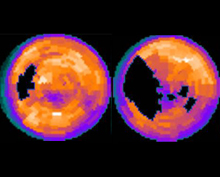Vietnam Vets with PTSD More Likely to Have Heart Disease
Vietnam Vets with PTSD More Likely to Have Heart Disease
Among male twin Vietnam veterans, those with post-traumatic stress disorder (PTSD) were more than twice as likely to have heart disease 13 years after being diagnosed as twin vets without PTSD. The finding suggests that PTSD may be a risk factor for heart disease.

Computer-generated map of the heart of a twin without PTSD (left) and with PTSD (right). / Image credit: Dr. Viola Vaccarino.
People with PTSD may persistently relive a traumatic experience through nightmares and flashbacks. They might have feelings of guilt or lose interest in activities that they used to enjoy. They may feel tense, have difficulty sleeping and be constantly on guard.
People with PTSD are thought to be at increased risk for heart disease, but past studies haven’t been conclusive. A team led by Dr. Viola Vaccarino at Emory University examined the association between PTSD and heart disease in Vietnam vets.
The researchers studied 281 pairs of middle-aged twins (170 identical and 111 fraternal) from the Vietnam Era Twin Registry. This registry includes twins from all military branches who both served on active duty during the Vietnam era (1964-1975). By studying twins, the researchers were able to control for the influences of genes and early environmental factors.
PTSD was assessed in the men in 1992, when they were an average of 43 years old. In some cases, one or both twins were diagnosed, and in other cases neither twin had PTSD. Heart disease was assessed between 2002 and 2010 by nuclear scans that examine blood flow in the heart muscle and by the presence of clinical events such as a heart attack. The study was funded in part by several NIH components, led by NIH’s National Heart, Lung and Blood Institute (NHLBI). Results appeared online on June 26, 2013, in Journal of the American College of Cardiology.
The incidence of heart disease was more than double among twins with PTSD than those without (23% vs. 9%). Heart disease was defined as having a heart attack, having been hospitalized for heart disease, or having had a heart procedure. Vets with PTSD had almost twice as many areas of reduced blood flow in their hearts as those who weren’t diagnosed with PTSD.
Vets with PTSD were more likely at baseline to smoke, drink alcohol, have hypertension, and to have been diagnosed with major depression, alcohol abuse and drug abuse. Similarly, at follow-up, those with PTSD were more likely to smoke and use alcohol. The association between PTSD and heart disease remained after adjusting for these factors.
“This study suggests a link between PTSD and cardiovascular health,” says Vaccarino. “For example, repeated emotional triggers during everyday life in persons with PTSD could affect the heart by causing frequent increases in blood pressure, heart rate, and heartbeat rhythm abnormalities that in susceptible individuals could lead to a heart attack.”
Future work examining the relationship between heart disease and PTSD will hopefully lead to better prevention and treatment strategies.
###
* The above story is reprinted from materials provided by National Institutes of Health (NIH)
** The National Institutes of Health (NIH) , a part of the U.S. Department of Health and Human Services, is the nation’s medical research agency—making important discoveries that improve health and save lives. The National Institutes of Health is made up of 27 different components called Institutes and Centers. Each has its own specific research agenda. All but three of these components receive their funding directly from Congress, and administrate their own budgets.



















